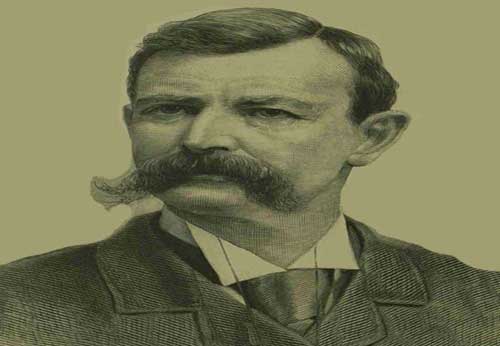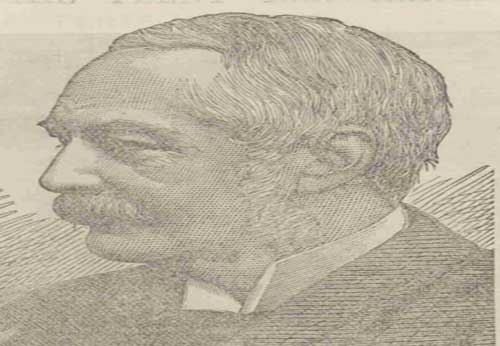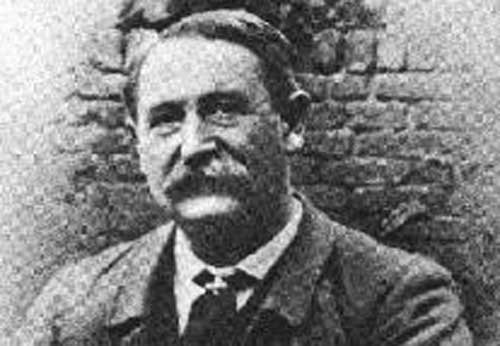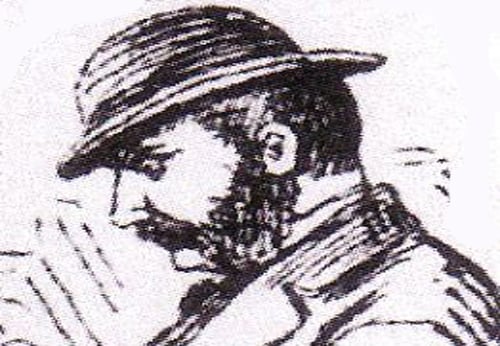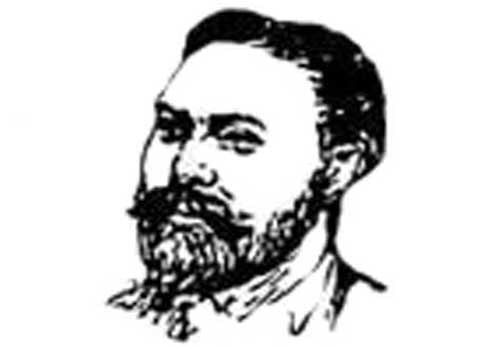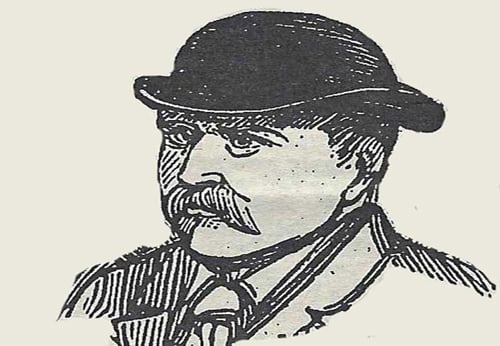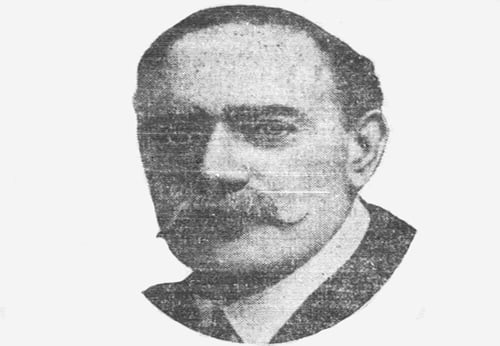- Detective Superintendent Alfred Lawrence Foster, of the City of London Police, was one of the detectives involved in the hunt for the murderer of Catherine Eddowes.
- He was a respected police officer, and was renowned for his courtesy and integrity..
- He gave several interviews to journalists in which he commented about the case.
- He later maintained that Jack the Ripper's identity was a great puzzle.
- Site Author and Publisher Richard Jones
- Richard Jones
SUPERINTENDENT ALFRED FOSTSER
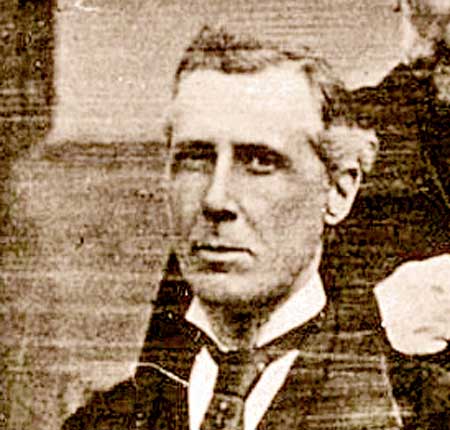
SUPERINTENDENT OF THE CITY OF LONDON POLICE
Detective Superintendent Alfred Lawrence Foster (1826 - 1897) was born in Birmingham, although his family moved to Warwick when he was young, and it was here that he grew up and was educated.
He left School when he was thirteen, and went to work in the office of a local solicitor, where he remained for the next five years.
In 1844, he moved to London and worked for the legal firm of Gregory, Faulkner, Gregory, and Skirrow.
A few years later, he became Deputy-Governor of the House of Detention in Clerkenwell - a post which he filled till the 29th of September, 1864, when he was appointment Superintendent of the City of London Police, with which force he would remain for the next twenty-seven years, up until his retirement, at the age of 67, on the 26th of May, 1892.
Foster - who was a teetotaller and a vegetarian - was held in high regard by all those that he came into contact with, and his integrity and courtesy were frequently mentioned by the newspapers in articles about him and about the cases he had been involved in.
HIS INVOLVEMENT WITH THE JACK THE RIPPER CASE
Since the murder of Catherine Eddowes took place in the City of London, the City Police were in charge of the investigation into the crime, and Superintendent Foster was called to Mitre Square, the scene of the murder, at 3 a.m. on the Sunday morning of September 30th, 1888.
Later that day, Foster gave an interview about the crime to a journalist, which was published in The Evening News:-
Mr. Foster, the superintendent of the City Police, upon being called upon last night by a representative of the Press, expressed his willingness to afford any information it would be safe to publish.
Shortly before three o'clock on Sunday morning, he was called up from bed by a report that a most terrible murder had been committed just inside the City boundary on the eastern side.
Measures had already been taken to detect if possible, the murderer, and these he supplemented by sending out a force of detectives and uniform men.
He stated the Police-constable Watkins, No. 881, who is an old and steady and careful officer, was on night duty in the neighbourhood of Houndsditch, Mitre-square, being part of the beat. At half-past one he passed through the square and looked well round, but the space seemed to be positively empty. The square is well lighted with two lamps, but the corner in which the woman was found is over-shadowed by two empty houses, but still the officer feels certain there was nothing in the corner at that time. It is part of his duty to look into this corner, and he is certain he did look in. A quarter of an hour later he again passed through the square, and then was horrified to see a woman with her throat fearfully gashed lying there in a pool of blood. On turning his light full on he further found that she had been disembowled. Parts of her entrails were lying on the pavement and another portion was twisted round her throat. He blew his whistle, and in a few seconds other offers came running up, and medical aid was summoned, but the woman was, of course quite dead.
Two sides of the square are formed by the extensive warehouses of Messrs. Kearly and Tonge, and Superintendent Foster says the watchman who was on duty in these buildings avers that the square was very quiet at the time, and he did not hear the slightest sound of anything unusual.
Near the scene of the murder there is also a night fire-station, and the several men who were on duty also state that they heard nothing to attract their attention.
A number of persons living within a few yards have also been questioned with a similar result, and they further say they saw nothing of a man and woman about the place.
The superintendent further said that Constable Watkins is a most reliable man and is no doubt correct about the time."
Source: The Evening News, Monday, 1st October, 1888.
GIVEN CHARGE OF JOSEPH LAWENDE
When Joseph Lawende came forward to state that he had seen Catherine Eddowes with a man at the entrance to Mitre Square, fifteen or so minutes before her body was found, he was seen as an important witness, and, as The Evening News reported, he was put under the care of Superintendent Foster:-
...the police [have] taken exclusive care of Mr. Joseph Levander, to a certain extent having sequestrated him and having imposed a pledge on him of secrecy. They are paying all his expenses, and one if not two detectives are taking him about. One of the two detectives is Foster..."
Source: The Evening News, Tuesday, 9th October, 1888.
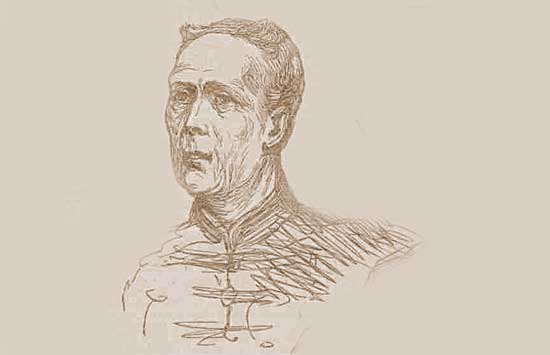
INQUEST AND LETTERS
Foster attended inquest into the death of Catherine Eddowes to watch the proceedings on behalf of the City of London Police Commissioner.
Two years later, as reported in the following article, which appeared in The Shields Daily Gazette, he commented on the numerous letters that purported to come from the murderer, that the police were receiving:-
Superintendent Foster, of the City Police, London, yesterday, stated to a reporter that the letters alluding to the reappearance of Jack the Ripper had been received at frequent intervals by the police, but no importance was attached to them.
The officer, however, added that the authorities have never relaxed their precautionary measures, and that they have still a number of men detailed off for that special duty."
Source: The Shields Daily Gazette, Friday, 3rd October, 1890.
HIS RETIREMENT
In May, 1892, after a long and distinguished career with the City of London Police, Foster announced his retirement, and The Pall Mall Gazette felt moved to comment on how popular he had been:-
Chief Superintendent Foster, of the City Police, who has just sent in his resignation after forty years service, has been one of the most highly respected officers of the force in London.
Among his own men his cheery disposition and his gentlemanly and upright conduct have always made him a favourite, but he has been no less popular with the general public of all ranks and conditions.
The wildest demonstrator that ever marched through the streets was always sure of courtesy and consideration from Mr. Foster: and it may be remembered that his sudden appearance on the scene as the procession approached Trafalgar-square on the famous Bloody Sunday of 1887 evoked round after round of cheers.
Mr. Foster is a total abstainer, and has frequently addressed popular audiences on the temperance question.
We trust that he may long be spared to enjoy a well-earned leisure.
Source: The Pall Mall Gazette, Wednesday, 18th May, 1892.
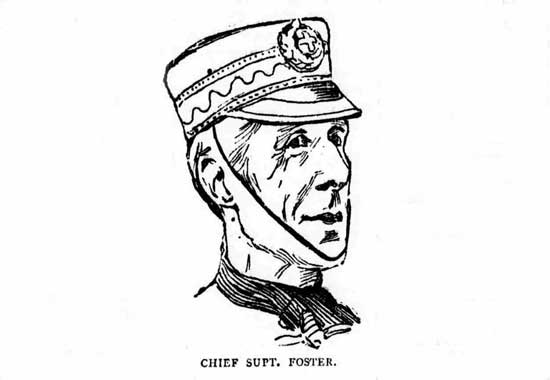
A QUARTER OF A CENTURY IN THE CITY POLICE
A CHAT WITH CHIEF SUPERINTENDENT FOSTER
The next day, the Gazette published an interview that one of its reporters had managed to secure with the retiring Superintendent, which had taken place the previous afternoon at the headquarters of the City of London Police in Old Jewry in the City of London:-
We stated yesterday that one of the best known officials of the City of London was about to retire. Mr. A. L. Foster, chief superintendent of the City Police, has resigned after twenty-seven years service, and a representative called at the police headquarters in Old Jewry yesterday, and had a chat with him.
"Many are familiar with the spare but striking figure of Mr. Foster," writes our representative, "but only those who have made his acquaintance know what a kindly and courteous officer he is. He has earned the rare distinction of being thoroughly respected by all classes - by City Fathers and Socialist agitators alike - and will carry with him into his retirement the best wishes of everybody.
A FINE FORCE
"During the twenty-seven years you have been in the City," remarked our representative, "you must have seen many changes both inside the force and outside it?"
"Yes," said Mr. Foster, "I have. There are the City police, for instance. They have, during my time, been reorganized and considerably augmented, a hundred men having been added - under the present Commissioner, Colonel Smith."
"But the area of the City has not been increased, why add a hundred men?"
"The area has not been increased, but the traffic has increased enormously within the last quarter of a century, and wants much more looking after than it used to do.
Then a number of what were comparatively quiet streets are now main thoroughfares, and the traffic along them has to be regulated.
The beats have had to be shortened, and all this of course requires more men."
"What about the morale of the force?"
"Well, the City Police, if I may be allowed to say so, have always borne an excellent character. I don't claim that they are superior to all others, but I believe that they will compare very favourably with any other force in the kingdom. Defaulters have been remarkably few, and the moral tone generally has been exceedingly good."
A TEETOTALLER AND THE "LOVING CUP"
"You are yourself, I believe, a teetotaller; are there many abstainers among your men? "
"There are a good many. It is nearly fifty years since I myself took the pledge, but, occupying an official position, I have never thought it desirable to preach total abstinence to the constables. I have always been ready to advise them, but I have never lectured them. I have too often seen the mistakes that have been made by over zealous advocates in this respect."
"Teetotalism is not usually a characteristic of mayoral banquets and civic functions, and I suppose you have often been present, at these?"
"Oh, yes, but when the loving cup has come to me I have simply bowed, and it has been passed on. My opinions in this respect are well known in the City, and have always been respected. I owe a great deal, I believe, so far as health and other comforts of life are concerned, to the fact that I have been a teetotaller."
A DRUNKARDS PARADISE
"Now, how about drunkenness and crime in the City during the last quarter of a century?"
"We have comparatively little drunkenness in the City simply because we have no resident population of the lower classes. And then, when a drunken person is taken to the station, he is treated very leniently. He is simply taken care of till he is sober and then liberated. An intoxicated man or woman arrested outside the City would be liable to be taken before a magistrate."
"FAIRLY PUZZLED" BY JACK THE RIPPER
"And crime?"
"With the exception of Jack the Ripper's Mitre-square tragedy, and the Cannon-street and Arthur-street murders, we have had nothing out of the ordinary in that way.
But that Mitre-square murder fairly puzzled me. I have been interviewed by eminent spiritualists and others on the subject, and have had great hopes at different times of lighting upon some clue, but have completely failed.
In fact, that crime is as great a mystery today as ever it was."
ON DUTY FOR ALL OCCASIONS
"You have had, of course, to go on duty on all big occasions in the City?"
"Yes, wet or dry, late or early. I laugh at some folks and their eight hours a day, and tell them that my hours of duty have always extended to the twenty-four."
"And what about the crowds with which you have had to deal?"
There is always a great crowd on Lord Mayor's Day, and every year it increases in size.
On the day when the Queen went to St. Paul's to return thanks for the recovery of the Prince of Wales there was an enormous assemblage in the streets.
I think, however, that the biggest crowd I have ever seen was when the Queen opened Blackfriars Bridge and the Holborn Viaduct. But we have really had no trouble with them."
"A MAN OF PEACE" AND THE PROCESSIONISTS
"Nor with the thousands of Dockers, or Socialists, or Salvatio1ists, who at different times have marched through the City? Indeed, you are credited with having managed these better than any one else."
"I would not say that, but I have got along first-rate with them all.
My principle has been this. I always remembered that I was a peace officer, and my desire has been that peace should be preserved.
Burns and Tillett, and the other leaders in those popular gatherings, I know; and when I have made any suggestion to them which I thought would assist in the preservation of order I have always found them very willing to carry it out. I could not possibly have got on better with these men and processions than I have done."
"Of course, you were always glad to get rid of the processions?"
"Oh, yes. I remember on one occasion Cardinal Manning, whom I knew very well, and for whom I entertained a very high respect, expressing his thanks to me for the assistance that we had rendered the League of the Cross during their processions. I made my cordial ackpow1ledgments to the Cardinal, but added, "Yes, your Eminence, I was pleased to see the League of the Cross in the City, but I was more pleased to see them out of it." The Cardinal said he quite understood, and he laughed heartily."
"You had large numbers of the unemployed, too, congregating in the City at one period?"
"Thousands of them used to assemble about the Mansion House, but there never was any disorder."
CROWDS AND HANGINGS AT NEWGATE
"Let me see, there were public executions in your time. How about the crowds at Newgate?"
"Oh, they were very large, especially when Barrett, for causing the explosion at the Clerkenwell House of Detention, was hanged. He was the last criminal who was publicly executed.
I was always on duty on these occasions, and it was gruesome work.
The gallows, a big lumbering machine on wheels, used to be run out of the prison at midnight on Sunday, and the crowd, which consisted of the vilest characters in London, began to assemble at that hour, and grew almost till the hour of execution, which was at eight o'clock the following morning.
The police had to form three sides of a square to keep the crowd back, and they had sometimes a pretty difficult task.
I think the Act of Parliament which made executions private, was a most excellent measure. Whatever opinions people may hold on the general question of capital punishment, there can be but one as to the wisdom of having it carried out within the precincts of the prison."
DATE OF RETIRMENT
"When do you actually retire, and where are you going?"
"I leave on the 26th of the present month. I have had for many years a house at Kingston-on-Thames, where I have spent much time, and I mean to settle down there."
LIFE IN THE OLD MAN YET
Yon don't think you will regret being out of harness or sigh for the dingy office in Old Jewry again?"
"Some of my friends in the City have been telling me that I shall be miserable, but I don't believe them.
My Kingston house is near Richmond Park, there is the river, and there are excellent roads in the district which, to a person like myself, who is fond of cycling, will be a great pleasure. Give me a fair share of health and I shall be all right, for, although I am sixty-seven years of age, there is a good deal of life in the old man yet."
"But mind you," added Mr. Foster, "I am leaving the service with the greatest regret. During my period of office I have met with nothing but kindness - in the force and out of it. I cannot speak in too high terms of the consideration and courtesy I have always received from the Commissioner, my colleagues, the Corporation, and the public. There has been no jarring anywhere, and I shall, as long as I live, look back with infinite pleasure to the twenty-seven years I have spent in the service of the City."
Source: The Pall Mall Gazette, Thursday, 19th May 1892.
A FAITHFUL AND EFFICIENT OFFICER
Another newspaper to comment on his distinguished career was The Shoreditch Observer, which published the following announcement of his impending retirement on Saturday, 21st May, 1892:-
Chief Superintendent Foster, of the City of London Police, has, after 40 years of service, sent in his resignation, which will take effect on the 26th inst.
By his retirement the City loses a faithful and efficient officer. Lord Mayors have come and gone, but the spare and ascetic form of Mr. Foster remained the emblem of continuity in the reign of law and order.
He was a living protest against the common notion that a vegetarian and a teetotaler cannot be a man of cheery and lightsome disposition, for at every convivial gathering of the force he was the life and soul of its mirth.
Already, with complete spontaneity, the men of the City Police are preparing to present Mr. Foster with a testimonial of respect, a movement which is not likely to be confined to the force with which he his been so long and honourably connected."
Source: The Shoreditch Observer, Saturday, 21st May 1892.
Article Sources
The Evening News Monday, 1st October, 1888.
The Evening News Tuesday, 9th October, 1888.
The Shields Daily Gazette Friday, 3rd October, 1890.
The Pall Mall Gazette, Wednesday, 18th May, 1892.
The Pall Mall Gazette, Thursday, 19th May, 1892.
The Shoreditch Observer, Saturday, 21st May 1892.

